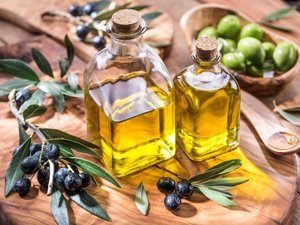The Mediterranean diet is renowned for protecting from heart diseases and other aging-related illnesses such as Alzheimer's. Studies have demonstrated time and again that the Mediterranean lifestyle itself fights off depression and dementia, and olive oil is the component to resort to! This means incorporating olive oil into a nutrient-poor diet will not help. The health benefits will depend on the pairing of diverse nutrients, i.e. veggies, herbs, spices, etc.
Olive oil is extracted from olives that are crushed into a paste that is pressed to extract the oil from it. The process remains pretty much the same for thousands of years, except the equipment is nowadays made of stainless steel instead of stone. The lower olive oil quality is usually used to produce soaps. The top of the line is designated as extra virgin olive oil (EVOO) and should be cold pressed, which means that the temperature of the pressing did not exceed 30 degrees Celsius. EVOO tastes really good and has a low acidity level. To make sure that the olive oil you are acquiring is of superior quality, buy it in a dark container, preferably made of glass. When olive oil is not stored properly or is exposed to light, it oxidizes and hence loses its nutrients. You will also want to avoid olive oil stored in plastic containers, even if they are dark, to keep BPA out of the oil. BPA poses a health risk and can cause several types of ailments. I am lucky to live in a country like Lebanon that produces and exports olive oil. The best tip about getting fine olive oil is to purchase it locally or from someone you trust. Olive oil can be stored for several years but the fresher you consume it the better: with time, oxidation makes the oil lose its content of polyphenols. If you can taste it before buying it, keep in mind that "bitter is better" when it comes to olive oil.
Now to the more serious part about olive oil. Olive oil generally protects the heart, helps fight cancer, and can even lower the risk of diabetes. It has anti-inflammatory properties and can decrease joint pain and arthritis. It supports cognitive and mental health in different ways. Because it contains a lot of polyphenols, olive oil can reduce dementia and Alzheimer's. It diminishes stress and anxiety and keeps the nervous system in good condition. It has a direct impact on learning as well as our memory. Olive oil is packed with antioxidants, which clear our system of free radicals and toxins. Vitamin E and K, which are supplied by olive oil, keep our brain sharp and maintain it young. Furthermore, olive oil boosts two brain-enhancing chemicals, i.e. brain-derived neurotrophic factor (BDNF) and nerve growth factor (NGF). These chemicals encourage the formation of new brain cells and their restoration. Additionally, olive oil promotes the immune system and increases bone density. No wonder Hippocrates, who is considered the "father of medicine", referred to olive oil as "the great healer". I see the next question coming: doesn't heating olive oil impair all the aforementioned perks?
Research shows that cooking with olive oil is safe. Mono-saturated fats that are contained in extra virgin olive oil are stable at room temperature. They remain fairly free from harm till the smoke point of olive oil, which lies at around 180 to 210 degrees Celsius. This is the temperature at which you sauté or stir fry food. Beyond such temperatures, degradation starts to occur. This makes olive oil a healthier cooking option than other vegetable oils like sunflower or soy oils. Of course, you still can use olive oil at room temperature in your salads, spreads, or dips. It is delicious and brings out the flavors exquisitely. Remember, olive oil is one of the healthiest nutrients. It helps with weight loss and digestion, clears and moisturizes the skin, helps with eczema, and is a natural earache remedy. So make sure to include it in your diet and lifestyle.
Bon appétit 😋

